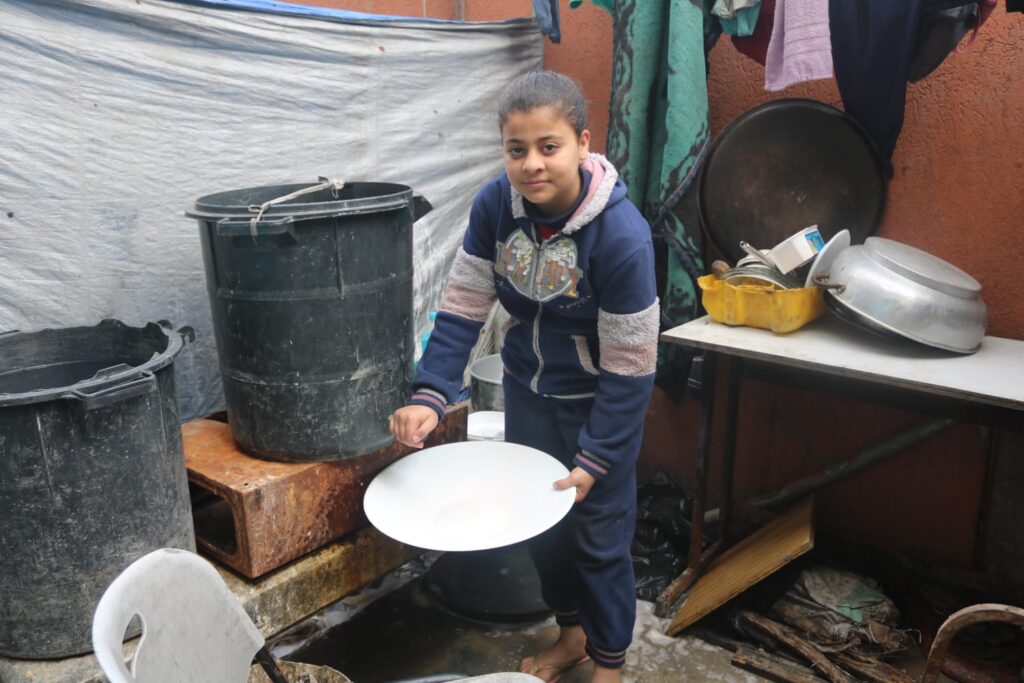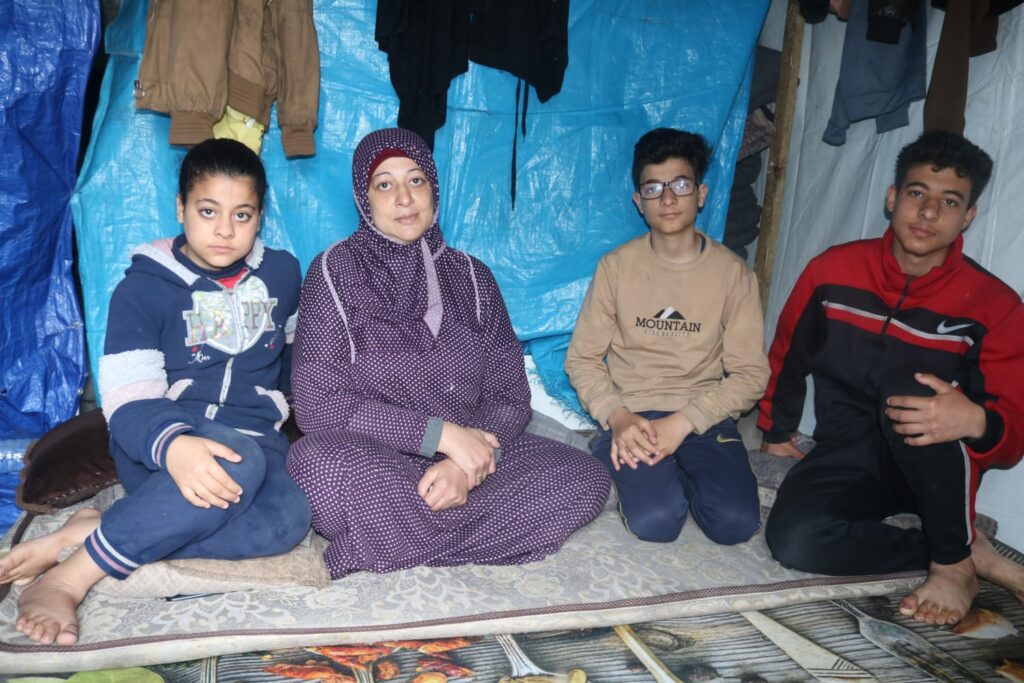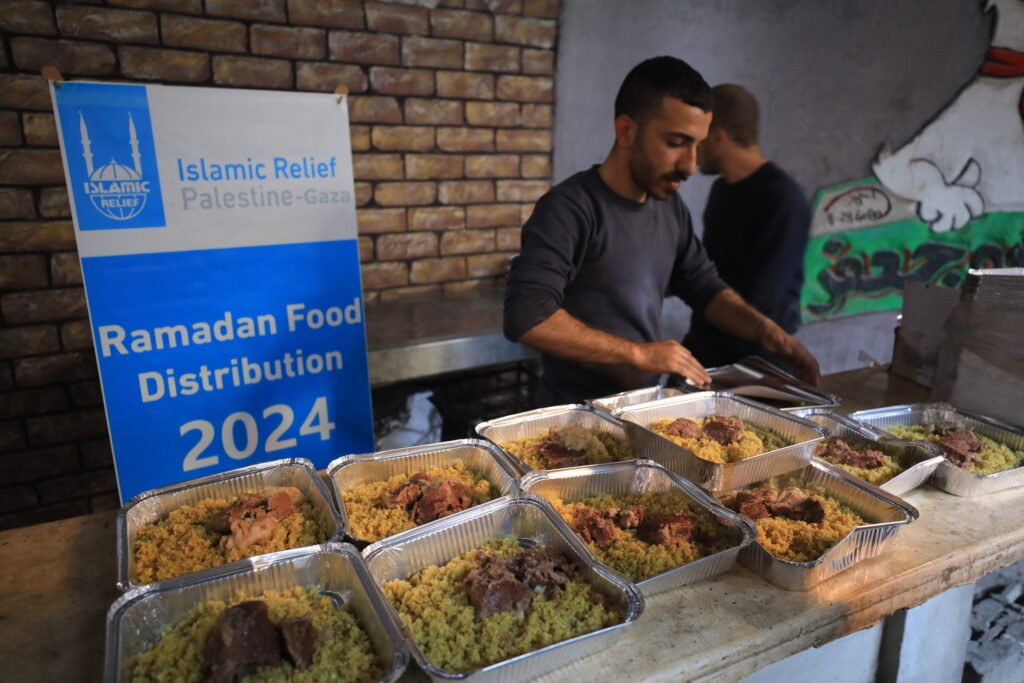Since an unprecedented escalation began on October 7, life in Gaza has become almost unliveable. Families have been driven from their homes with little more than the clothes on their backs.
Displaced and starving as famine looms, parents are faced with the impossible task of keeping their children safe and fed amid this crisis.
For some of these children, school has become a distant memory, as so many school buildings have been destroyed or converted into desperately needed shelters.
Amid this upheaval, children like Mariam feel their youth slipping away. “I feel like I’ve aged years beyond my actual age,” the 10-year-old says.
“My family and I are living through the worst days of fear, terror, insecurity, cold, hunger and thirst. We never imagined we would experience such days. We have been deprived of our entire childhood and our right to live a safe life.”
Sadly, this is not the first deadly escalation Mariam has experienced, but this intensity of violence has never been seen before.
More than 33,000 people are reported to have been killed in Gaza since October, including many children. Over 200 aid workers have died, as well as medics and news reporters. Parents have been killed trying to reach aid trucks to feed their families, while the death toll from Gaza’s famine continues to mount, with scores of children dying from malnutrition and dehydration.
Some 75,800 people have been injured, while more than 7,000 more are missing, according to local authorities.
Throughout more than 180 days of bombing, hospitals, homes and vital infrastructure have been reduced to rubble. Entire neighbourhoods are uninhabited and unrecognisable. The scale of the destruction is difficult to comprehend and will only increase as attacks continue without a ceasefire in place.
Sleeping under Allah’s protection
As more than 1 million people were ordered to flee their homes in the first weeks of the crisis, Hanaa, Mariam’s mother, says she resisted leaving her house for just over a month, sheltering there with her 4 children.
“We were sleeping under Allah’s protection when suddenly a missile fell into our living room. Thankfully, it did not explode. We rushed out in the middle of the night and spent the entire night on the street amid cold, fear, shelling, and missiles above our heads. We didn’t know where to go.”
The family left home with nothing, making their way to a relative’s home in Jabalia camp, but they would not stay for long.
“Death continued to pursue us,” Hanaa says. “Once night fell, rockets began to fall throughout the night. The house walls collapsed due to the intense shelling. We waited until dawn then decided to go to a school in the hopes of finding safety. Just minutes before we reached the school, it was bombed, and we narrowly escaped death for the third time.”
Hanaa and her children fled south, staying with family in Rafah for only 1 night. “When daylight broke, I wished it hadn’t, so we could rest a bit more. We were exhausted. We had walked from Gaza’s north to its south. I did not know where to go with my children in the cold. We had no blankets or warm clothes to shield us, and we didn’t have any money to buy anything from the markets.”

Fortunately, one of Hanaa’s sons, Mohammed, remembered another relative living in the south who welcomed the family despite being displaced himself. The family is now sheltering in a tent inside a school with 15 other people. The cramped conditions are challenging, and Hanaa and her children initially slept on nylon bags before finding mattresses. Getting enough food to eat is a constant struggle.
“When we arrived in the south, flour, bread and vegetables were not available and when they were, they were very expensive and beyond our means. I would send my children to free distribution centres, where they would wait for hours in long queues, often coming back empty-handed. If they did manage to get something, it was very little and not enough to feed us all,” Hanaa says, recalling surviving on lentil soup for 2 months and learning how to cook over an open fire.
In the camp, Hanaa’s children contracted hepatitis, but the treatments suggested by a doctor – vitamins, supplements, sweets and medication – were simply unaffordable.
“We [even] struggle to find water for bathing and suffer from a shortage of clean drinking water… we also lack hygiene products like disinfectant, shampoo, soup and many other necessities that prevent the spread of disease,” Hanaa says. More than 300,000 people living in camps like Hanaa and her family have reported acute respiratory infections, while 200,000 cases of acute watery diarrhoea have also been reported. Diseases such as jaundice, hepatitis A, scabies and skin rashes have also risen sharply.
“I wish I had enough money to set up a tent for me and my children to live in a clean, healthy environment. Rainwater falls on us during every downpour, soaking the bedding, which takes a week to dry. My children still suffer from illness. I’m very afraid. I fear losing any of them in these dire conditions.”
A lifeline for families in need
Hanaa’s family is one of more than 10,000 in Gaza now supported by Islamic Relief’s Orphan Sponsorship Programme, which we have expanded in Gaza since October to help meet families’ desperate needs. The monthly stipend, which once covered education and healthcare costs, is now a vital lifeline for the family. When the stipend arrived, Hanaa says she cried tears of joy.
“I hurried to withdraw the money and went straight to the market. I bought 3 blankets, flour, some vegetables, and canned food to feed my children. Since I couldn’t find clothes for my daughter Mariam, who was very sick and needed warmth, I bought her a coat.”

“I almost flew with joy when my mother came back carrying flour, food and canned food for us,” Mariam remembers. “I had been craving them for months and thought we might never eat them again. I was so happy with the new coat; I quickly put it on and prayed fervently to Allah to reward the sponsor who did not forget us in these difficult circumstances.”
Islamic Relief’s Orphan Sponsorship Programme is vital for families in Gaza, never more so than now. The regular stipend is helping families like Mariam and Hanaa’s to keep warm and fed amid displacement and disaster.
Providing food, water and respite
The dangerous situation on the ground since October 7 has forced Islamic Relief to suspend our long-term programming, with the exception of the Orphan Sponsorship Programme. Instead, our staff and partners on the ground have scaled up our emergency response.
We have prepared and served well over 10 million hot meals in shelters, helping to keep displaced people fed amid the crisis. In partnership with the World Food Programme (WFP), we have been supplying some 35,000 mothers and their young children with nutritional supplements on a biweekly basis to combat malnutrition. This programme allows food packs containing essential supplies to reach 54,000 families in need.
In the earliest days of the crisis, we distributed more than 2.3 million medical supplies to healthcare facilities, and we continue to support the struggling healthcare sector by paying the salaries of doctors at a small health clinic dealing with minor treatments and consultations. In shelters, we distribute water and organise games and other activities to offer some respite and counselling to displaced children.

All of this work is made possible by the generosity of our donors and makes a real impact on people struggling to survive. However, it covers only a tiny portion of the huge humanitarian need in Gaza. Much more support is needed, and it cannot be provided by humanitarian organisations alone.
There is no excuse for the entirely man-made disaster unfolding in Gaza before the eyes of the world. Israel continues to prevent sufficient humanitarian aid from entering Gaza. Many international governments and world leaders are complicit, or risk being complicit in the suffering by repeatedly failing – or refusing – to act to stop it.
Islamic Relief continues to call for an immediate and permanent ceasefire and for international law to be upheld. We are calling for an end to the Israeli siege so that humanitarian aid, commercial goods, and critical supplies such as fuel can enter Gaza in sufficient quantity to meet the needs of its population.
We continue to call on our donors and supporters to give what they can to support people in Gaza whose homes, livelihoods and futures have been ripped from them. While a hot meal or drink of clean water cannot erase their suffering, they can help families and individuals to survive this crisis.
Please help Islamic Relief to continue providing this essential support. Donate now to our Gaza Emergency Fund. Please also contact your political representatives and urge them to demand an immediate ceasefire and unrestricted humanitarian access into Gaza.










